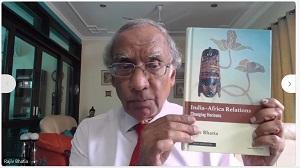The Vivekananda International Foundation organised a book discussion on "India-Africa Relations: Changing Horizons", on March 23, 2022. The event was chaired by Dr Arvind Gupta, Director, VIF. Author of the book Ambassador Rajiv Kumar Bhatia delivered a talk on the book followed by a discussion of the book by Ms Ruchita Beri, Senior Research Associate, IDSA and Samir Bhattacharya, Research Associate, VIF.
The author was India's Ambassador/High Commissioner in Kenya, Myanmar, Mexico, and South Africa. Currently, he is a Distinguished Fellow of the Foreign Policy Studies Programme at Gateway House. In his new book titled "India-Africa Relations: Changing Horizons", the author contemplates the rise to the prominence of the African continent as a prominent global actor. In this book, the author tracks the evolution of the India-Africa relationship in changing geopolitical realities and outlines a series of events that led to this transformation.
The author described the principal objective of the book as to instil in readers the desire to know more about Africa. In addition to spending seven years in Africa as a diplomat and gaining practical experience, he took another two and half years to write the book. The transition from diplomat to scholar was not easy. However, the desire to work for Africa compelled him to finish the project.
As per the author, Africa is not a monolith. It is a continent with huge diversity. It isn't easy to pinpoint one particular event or epoch as the continent has multiple transitions. The impact of colonialism is still pervasive. During the post-colonialism era, the hope of African rise was quickly replaced by frequent changes of government and rise of many tyrant leaders. In the 90s came the independence of SA and Namibia, which was another critical transformative moment for the continent.
Currently, Africa is attracting much interest worldwide, mainly due to its resource richness. While it might have some negative connotations, this newly-grown interest in Africa has raised its profile. Africa is much more assertive in different global platforms and practising its agency to the fullest. Although Japan started Africa+1 seminars with the continent, as per the author, the dimension of Chinese engagement in Africa shook the world and made them rush towards a so-far abandoned continent. Today, Africa is engaging not only its traditional partners like US, France or UK, but it is also engaging with new and emerging economies such as India, China, Turkey, Russia, Brazil, UAE, Indonesia etc.
The author notes that between March 2015 and October 2019, there were 34 outgoing visits to Africa by Indian top leaders at the level of President, Vice President, and Prime Minister. Simultaneously, India hosted nearly 100 African leaders for bilateral and multilateral meetings during the same period. The question being raised is whether India's foreign policy would lead to establishing "Indiafrica," as India demonstrates its desire to assert itself as a power to be reckoned with in a more multipolar world? As per the author, the answer is yes. But it will require sustained effort and persistent engagement.
The author describes that instead of broad generalisations about a continent twenty times the size of India, he chose to focus on 15 specific countries with which India has significant interactions, and he has presented a snapshot of India's engagement with each one of them, individually. In the book, the author has tried to give a non-exhaustive list of contemporary political, economic, demographic, and social trendsthat played a significant role in charting the path of this relationship. The author mentioned all the historical events and gave due credit to each leader for what they have contributed towards improving the India-Africa relationship. The author also spoke about the role of Gandhi in the African independence struggle. Despite some recent controversies and allegations against Gandhi being racist, the author has explained the helplessness of Gandhi and how Gandhi still contributed.
According to the author, India might now consider forging multi-layered connections with some strategically significant African countries. Mozambique is one such case. Mozambique receives around a fifth of India's overall FDI in Africa. India also offers a huge variety of aid and training programmes, most notably training for military and intelligence services. Rwanda is another country in which India is becoming more interested. India must form similar partnerships with other African countries in which it is interested, whether in raw materials, oil and gas, market development, or human resource development.










Post new comment